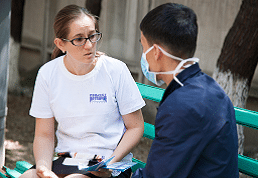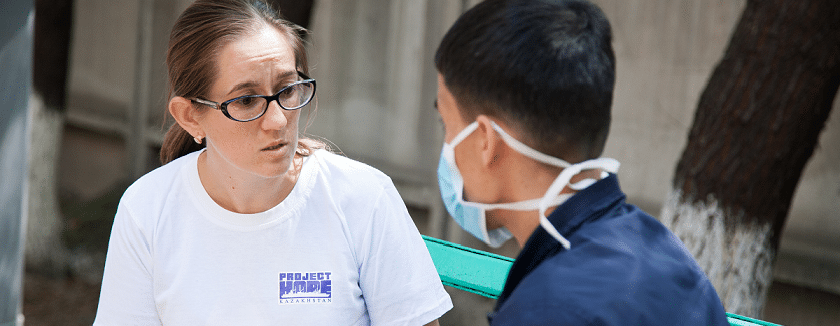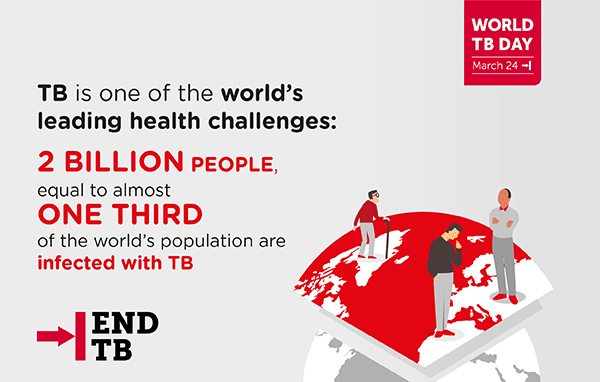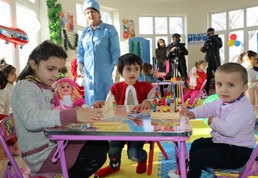
Innovation, Education and Patient Support Turning the Tide on TB
Despite most cases of TB being curable with a six month treatment regimen that costs less than $40 dollars, every day there will be another 28,500 new cases of TB. We must do more to end TB.

In 2018, TB is still the leading killer among global infectious diseases
Every March 24th, organizations around the world mark World TB Day, mobilizing action in the fight to finally eradicate this deadly disease. To underline the seriousness of this battle, the World Health Organization reports on this day, as it does on any other day, there will be another 28,500 new cases of TB, another 4,600 deaths and 11,100 more cases missed.
We continue to stand in support of World TB Day and the campaign to end TB.

Our approach
The impact of TB is widespread and crippling – which is why Project HOPE has been a leader in the prevention, control and treatment of the disease for 25 years. Project HOPE helps to ensure health care workers have the resources and skills they need to deliver expert care. We have also invested significant resources to strengthen health systems by upgrading laboratory services and equipment.
Our extensive training for health professionals includes an emphasis on increasing awareness and diagnosis of TB. Working with the most vulnerable populations, including migrant workers and people with already comprised immune systems, Project HOPE is constantly seeking new ways to speed up the diagnosis of TB and get people in treatment sooner, stopping the spread of this curable disease and saving lives.
According to Miriam Sianozaova, Project HOPE’s Regional Director in Europe/Eurasia:
“Our work has contributed to a 22 percent reduction of TB mortality rates in all five central Asian countries”
This improvement is the result of direct interventions and a comprehensive approach, including programs addressing multidrug resistant tuberculosis (MDR TB) and TB/HIV co-infection.
Empowering women for improved TB prevention and care
As part of our efforts to effectively combat TB, HOPE’s current programs are specifically tailored to suit the needs of individual countries and their local communities.

This includes Central Asia, where we have launched a unique joint program in Tajikistan that promotes greater engagement and empowerment of women in TB advocacy. Through education and outreach events, we help provide women with improved access to TB prevention, detection, and care in Tajikistan’s rural areas. Due to the stigma associated with this infectious but curable disease, women in Tajikistan are less likely to seek TB care. Through free TB education and testing events held with support from USAID’s TB Control Program, more than 10,000 women in Tajikistan’s Sughd, Khatlon and Rasht Valley regions have received information and have been tested for TB.
The Goal: To make affected communities more resilient against the spread of this disease and to contribute to the improved health and well-being of their residents.
Recently, to mark International Women’s Day, the program and its national partners held a roundtable meeting on TB prevention and detection for 30 female community members representing local Women’s and Youth Committees, primary and secondary schools, universities, and communities.
Supporting the UN Sustainable Development Goals to end TB by 2030

Project HOPE is doing its part to help the United Nations reach its goal by supporting its international efforts to end tuberculous.
In addition to many upcoming events, in February 2018, our program in Tajikistan organized a forum for nearly 100 leading national and international TB experts, policymakers, and public health professionals representing the Government of the Republic of Tajikistan, United States Agency for International Development (USAID), the World Health Organization (WHO), and international and national civil society organizations. Participants shared successes and lessons learned in the implementation of patient-centered models of TB care.
In December, 2017, we convened a high level regional meeting on “Migration and Tuberculosis: Cross-border TB Control and Care in the Central Asian Region” in collaboration with the Ministry of Health of the Republic of Kazakhstan, the Global Fund to Fight AIDS, Tuberculosis and Malaria and USAID, which was attended by representatives of government agencies, national TB programs and migration authorities from Central Asia, as well as experts from WHO and the STOP TB Partnership.
HOPE’s TB experts were once again among the thousands of international delegates from more than 100 countries gathering at the annual Union World Lung Conference on Lung Health.
- How to Increase Access of Migrants to TB Diagnosis and Treatment in Kazakhstan?
- Innovations in Kyrgyzstan: TB Sputum Transport Solutions
- QMS Implementation in the TB Laboratory Network in Uzbekistan
- Resistance Patterns of Rifampicin Strains of M. Tuberculosis Isolated in Tajikistan
- The Role of Field Promoters in TB Response in Three Regions of Namibia
Collaborating to end TB: Success Stories
Collaboration is a critical component of Project HOPE’s success in advancing new strategies to identify, prevent and treat TB. Our partnership with USAID has yielded many transformational stories of patients, health workers and communities:
- Former TB Patient Finds Purpose in Reaching Out to Those Whose Experience He Knows Well
- Strengthening Uzbekistan’s Laboratory Services – the Cornerstone of Early Tuberculosis Detection
- Keeping Patients and Health Care Workers Safe While Treating TB Patients in Uzbekistan
- Regional and Local Authorities in Tajikistan Support TB Patients in their Communities
- USAID Ensures Continued Rapid TB Testing in Uzbekistan
- Engaging Communities to Support TB Patients and Their Families in Tajikistan
HOPE for TB’s Youngest Patients

In Tajikistan, as many as 600 children become ill with TB every year. To receive treatment, the majority have to be hospitalized and, as a result, separated from their families for months at a time. For these children, a hospital stay is a very long, lonely, and scary experience. See how we are bringing HOPE to these young patients.
Ongoing innovation is a critical component in combating this global health crisis. Project HOPE’s team in Kyrgyzstan launched a pilot program that utilizes GPS and digital technologies to more efficiently diagnose TB and deliver early treatment for patients.